英语专业 高级英语第11课 beauty (课堂PPT)
- 格式:ppt
- 大小:340.50 KB
- 文档页数:42
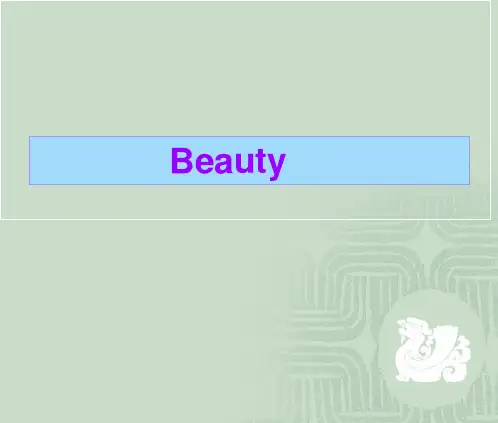
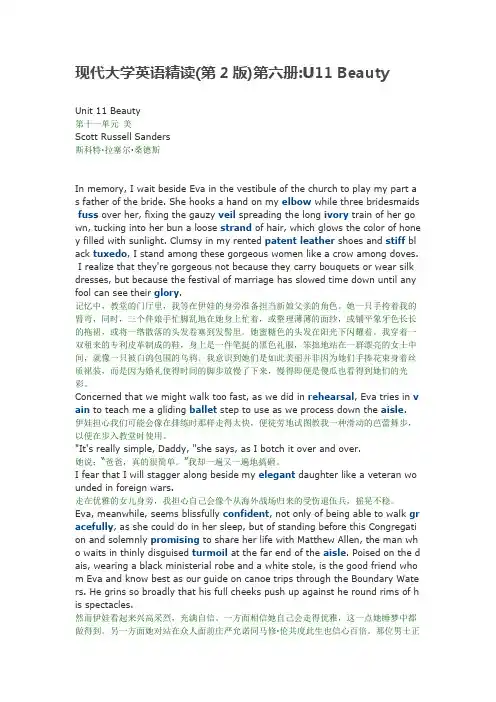
现代大学英语精读(第2版)第六册:U11 BeautyUnit 11 Beauty第十一单元美Scott Russell Sanders斯科特·拉塞尔·桑德斯In memory, I wait beside Eva in the vestibule of the church to play my part a s father of the bride. She hooks a hand on my elbow while three bridesmaids fuss over her, fixing the gauzy veil spreading the long ivory train of her go wn, tucking into her bun a loose strand of hair, which glows the color of hone y filled with sunlight. Clumsy in my rented patent leather shoes and stiff bl ack tuxedo, I stand among these gorgeous women like a crow among doves.I realize that they're gorgeous not because they carry bouquets or wear silk dresses, but because the festival of marriage has slowed time down until any fool can see their glory.记忆中,教堂的门厅里,我等在伊娃的身旁准备担当新娘父亲的角色。
她一只手挎着我的臂弯,同时,三个伴娘手忙脚乱地在她身上忙着,或整理薄薄的面纱,或铺平象牙色长长的拖裙,或将一绺散落的头发卷塞到发髻里。
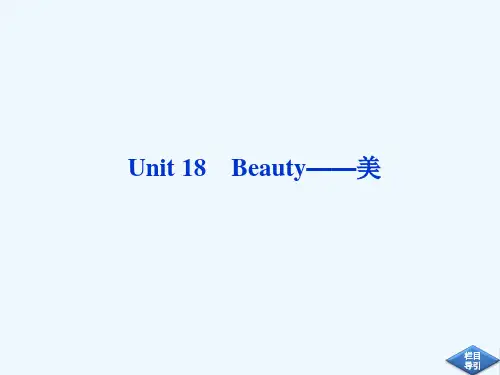
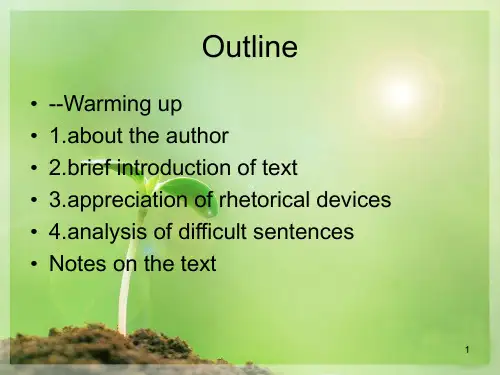
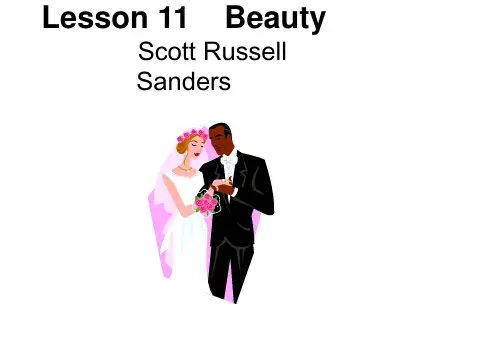
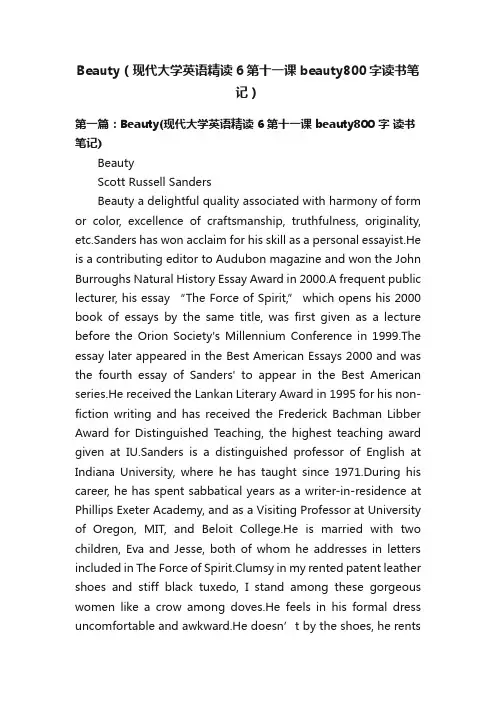
Beauty(现代大学英语精读6第十一课beauty800字读书笔记)第一篇:Beauty(现代大学英语精读 6第十一课 beauty800 字读书笔记)BeautyScott Russell SandersBeauty a delightful quality associated with harmony of form or color, excellence of craftsmanship, truthfulness, originality, etc.Sanders has won acclaim for his skill as a personal essayist.He is a contributing editor to Audubon magazine and won the John Burroughs Natural History Essay Award in 2000.A frequent public lecturer, his essay “The Force of Spirit,” which opens his 2000 book of essays by the same title, was first given as a lecture before the Orion Society's Millennium Conference in 1999.The essay later appeared in the Best American Essays 2000 and was the fourth essay of Sanders' to appear in the Best American series.He received the Lankan Literary Award in 1995 for his non-fiction writing and has received the Frederick Bachman Libber Award for Distinguished Teaching, the highest teaching award given at IU.Sanders is a distinguished professor of English at Indiana University, where he has taught since 1971.During his career, he has spent sabbatical years as a writer-in-residence at Phillips Exeter Academy, and as a Visiting Professor at University of Oregon, MIT, and Beloit College.He is married with two children, Eva and Jesse, both of whom he addresses in letters included in The Force of Spirit.Clumsy in my rented patent leather shoes and stiff black tuxedo, I stand among these gorgeous women like a crow among doves.He feels in his formal dress uncomfortable and awkward.He doesn’t by the shoes, he rentsthem.Because such formal shoes are only worn on very formal occasions and there is not much chance for the author to wear them.A crow with black feathers among white doves will present a sharp contrast.The author is in black and is stiff and awkward and maybe even appear quite out of place in the suit among those women dressed in silk with bright colors.The contrast is as sharp as the contrast between a crow and doves.But because the festival of marriage has slowed time down until, any fool can see their glory.I fear that I will stagger along beside my elegant daughter like a veteran wounded in foreign wars.The glow of happiness had to cool before it would crystallize into memory.It is the sharp excitement of beauty which filled me with joy when Eva held my arm during the wedding march.The same excitement of beauty fills me with joy when, on these September nights, I walk over dewy grass while thecrickets sing and when I stare at the Milky Way.The Basic PracticeThe Navaho blessing “May you walk in beauty” catches the essence of this spiritual practice.Beauty is both a path you travel and what surrounds you on the path.In the splendor of the Creation, we see its outer forms.In morality and benevolence, we recognize its inner expressions.Start this practice with the assumption that beauty is everywhere just waiting for you to notice it.Allow yourself to feel its effect upon your soul.Some experiences will stop you in your tracks and take your breath away.Others will be more subtle but equally sublime.Then make your actions reflections of the beauty all around you.Why This Practice May Be For YouClutter gets in the way of beauty.If we have too many things and tasks in front of us, we may not notice what is beautiful aboutthem.The contrast is simplicity;by paring away excesses, we make an opening for splendor.Routine and rigid thinking also restrict our appreciation of beauty.If we are stuck in a rut, we never discover the refreshment waiting just around the corners of our daily schedule.If we have a narrow understanding of aesthetics, we are limited in our ability to recognize beauty's varied manifestations.Beauty is startling, stimulating, and soothing.Try this practice when you need to be pulled out of your habitual way of seeing and being.Its cultivation produces pleasure.At the end of Beauty the author say that beauty needs us to recognize it.And he ex plains it like this :“We can’t possibly be important to the universe because we eat and drink and procreate, since countless other species do as much.If we have a distinctive role to play—and I emphasize the if—it must have to do with what’s unusual about us, and that, surely, is our use of articulate language.I don’t mean speech alone, although that’s the source of all language, but also music, painting, mathematics, architecture—all the means of expression that we have invented.We take the world in through our senses, reflect on it, and give it back in some orderly form.That act of response and expression is just as vital to the gardener or dancer as to the writer or physicist.It’s what distinguishes us as a species, and it may be what justifies our existe nce.”第二篇:有关Beauty的英语演讲稿How to describe beauty Good afternoon, ladies and gentlemen.I am glad to stand here and give a short speech.My topic is “how to describe beauty”.If we want to describe beauty specifically, we should manage to find out the real beauty firstly.As Rodin said, “The life is not a lack of beauty, but the lack of discovery.”In natural world, beauty is everywhere.For example, the mountains and the sun.The mountains display different scenery in different seasons.In summer, they seem to wear green coats.We will feel comfortable when we look at them.In winter, they seem to wear white coats.How beautiful they are!For the sun, our moods fluctuate when we look at it.The rising sun makes us energetic and hopeful.The setting sun let us feel peaceful and harmonious.So we can describe natural beauty in various ways.In human community, beauty includes the outward beauty and the inner beauty.For the outward beauty, we can use beautiful words to describe it.As we can see, more and more people pursue the ideal shape so that there are so many people losing weight.Indeed, we like the good-looking.However, I deem that it is skin-deep for us to pay attention to the outward beauty only.The inner beauty is more moving than the outward beauty.For example, the explosion hazard in Binhai, Tianjin, on August 12th.At that night, many firemen were obliged to put out the fire and showed their courage.In the end, many firemen sacrificed their lives for the benefits of the local people.Naturally, we can discover the inner beauty from them.We are touched by their fearlessness and we have the utmost respect for them.Beauty is everywhere as long as we pay attention to our life.By taking care of the various natural beauty and focusing on the inner beauty more than the outward beauty, we can explicitly describe beauty.Let us enjoy beauty around us.That’s all.Thanks for your listening.第三篇:现代大学英语精读对《大学英语精读》教材进行评价《现代大学英语精读》是我们大家熟悉的一本教材。
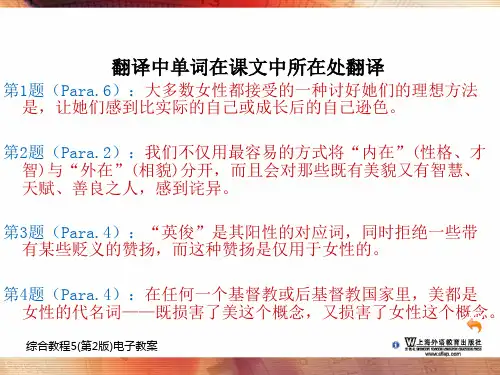

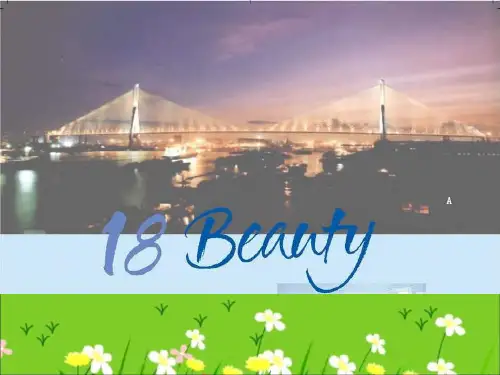
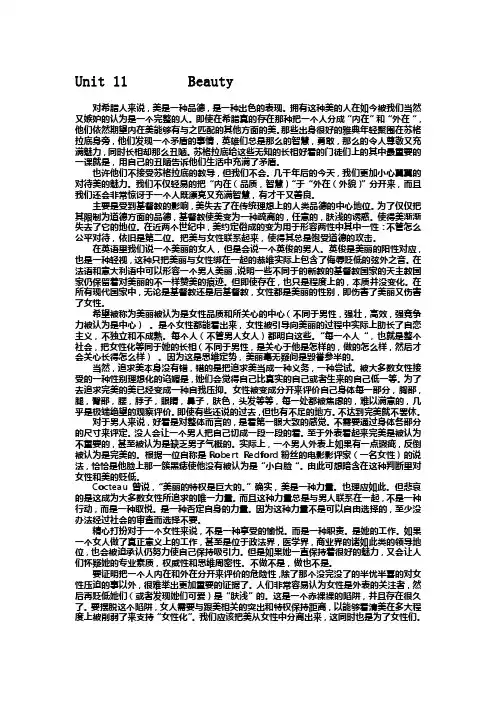
Unit 11 Beauty对希腊人来说,美是一种品德,是一种出色的表现。
拥有这种美的人在如今被我们当然又嫉妒的认为是一个完整的人。
即使在希腊真的存在那种把一个人分成“内在”和“外在“,他们依然期望内在美能够有与之匹配的其他方面的美。
那些出身很好的雅典年轻聚围在苏格拉底身旁,他们发现一个矛盾的事情,英雄们总是那么的智慧,勇敢,那么的令人尊敬又充满魅力,同时长相却那么丑陋。
苏格拉底给这些无知的长相好看的门徒们上的其中最重要的一课就是,用自己的丑陋告诉他们生活中充满了矛盾。
也许他们不接受苏格拉底的教导,但我们不会。
几千年后的今天,我们更加小心翼翼的对待美的魅力。
我们不仅轻易的把“内在(品质,智慧)“于“外在(外貌)”分开来,而且我们还会非常惊讶于一个人既漂亮又充满智慧,有才干又善良。
主要是受到基督教的影响,美失去了在传统理想上的人类品德的中心地位。
为了仅仅把其限制为道德方面的品德,基督教使美变为一种疏离的,任意的,肤浅的诱惑。
使得美渐渐失去了它的地位。
在近两个世纪中,美约定俗成的变为用于形容两性中其中一性:不管怎么公平对待,依旧是第二位。
把美与女性联系起来,使得其总是饱受道德的攻击。
在英语里我们说一个美丽的女人,但是会说一个英俊的男人。
英俊是美丽的阳性对应,也是一种轻视,这种只把美丽与女性绑在一起的恭维实际上包含了侮辱贬低的弦外之音。
在法语和意大利语中可以形容一个男人美丽,说明一些不同于的新教的基督教国家的天主教国家仍保留着对美丽的不一样赞美的痕迹。
但即使存在,也只是程度上的,本质并没变化。
在所有现代国家中,无论是基督教还是后基督教,女性都是美丽的性别,即伤害了美丽又伤害了女性。
希望被称为美丽被认为是女性品质和所关心的中心(不同于男性,强壮,高效,强竞争力被认为是中心)。
是个女性都能看出来,女性被引导向美丽的过程中实际上助长了自恋主义,不独立和不成熟。
每个人(不管男人女人)都明白这些。
“每一个人“,也就是整个社会,把女性化等同于她的长相(不同于男性,是关心于他是怎样的,做的怎么样,然后才会关心长得怎么样)。
